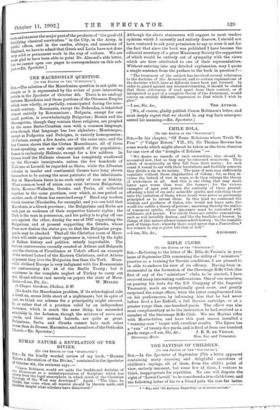THE MACEDONIAN QUESTION.
[To TUE EDITOR OF THIS "SPECTATOEL1 Sin —The solution of the Macedonian question is not quite so simple as it is represented by the writer of your interesting article in the Spectator of October 4th. There is no analogy between Macedonia and those portions of the Ottoman Empire which were wholly, or partially, emancipated daring the nine- teenth century. Roumania, except the Dobrudza, is inhabited almost entirely by Roumanians ; Bulgaria, except for one small portion, is overwhelmingly Bulgarian; Bosnia and the Herzegovina, though they contain three religions, are peopled by the same Serbo-Croatian race with a common language, even though that language has two alphabets ; Montenegro, except at Podgorica and Dukigno, is entirely homogeneous ; all Cretans, except a few Arabs, are of the same race, and the last Census shows that the Cretan Mussulmans, all of them Greek-speaking, are now only one-ninth of the population ; Samos is exclusively Hellenic, except for a few soldiers. In Greece itself the Hellenic element has completely swallowed up the Slavonic immigrants, unless the few hundreds of Tzikones at Leonidi be regarded as Slays; while the Albanian colonies in insular and continental Greece have long shown themselves to be among the most patriotic of the inhabitants. But in Macedonia there is no such unity of race or history. What common bond of union can exist between Bulgarians, Serbs, Koutzo-Wallachs, Greeks, and Turks, all collected together in the same province, over which, at one period or another, each of them has exercised sway P Read any modern Greek treatise (Nicola:ides, for example), and you are told that Macedonia is a Greek province ; the Bulgarians and Serbs are each just as cocksure of their respective historic rights ; the Turk is the man in possession, and his policy is to play off one race against the other, during the war of 1897 supporting the Bulgarians, and at present supporting the Greeks, whose Press now desires the status quo, so that the Bulgarian propa- ganda may be checked. That all the Christian races of Mace- donia will unite against their oppressor is, viewed by the light of Balkan history and politics, utterly improbable. The furious controversies recently created at Athens and Belgrade aver the election of Firm ilianos at Uskub afford an example af the mutual hatred of the Eastern Christians, and at Athens at present they love the Bulgarian less than the Turk. Mean- while civilised Europe is very indignant with the Roumanians for contravening Art. 44 of the Berlin Treaty ; but it acquiesces in the complete neglect of Turkey to carry out Art. 23 and reform (not merely on paper) the state of Mace-
10 Cheyne Gardens, Chelsea, S.W.
[No doubt the Macedonian problem, if its ethnological side is dwelt on, seems little short of a nightmare ; but in spite of at, we think our scheme for a principality might succeed. It, or rather that of a province ruled by an independent Governor, which is much the same thing, has succeeded kdruirably in the Lebanon, though the mixture of races and creeds, and their mutual hatreds, are quite as great. Bulgananz. Serbs, and Greeks cannot hate each other worse than do Druses, Maronites, and members of the Orthodox Cborch.—En. Spectator.]










































 Previous page
Previous page